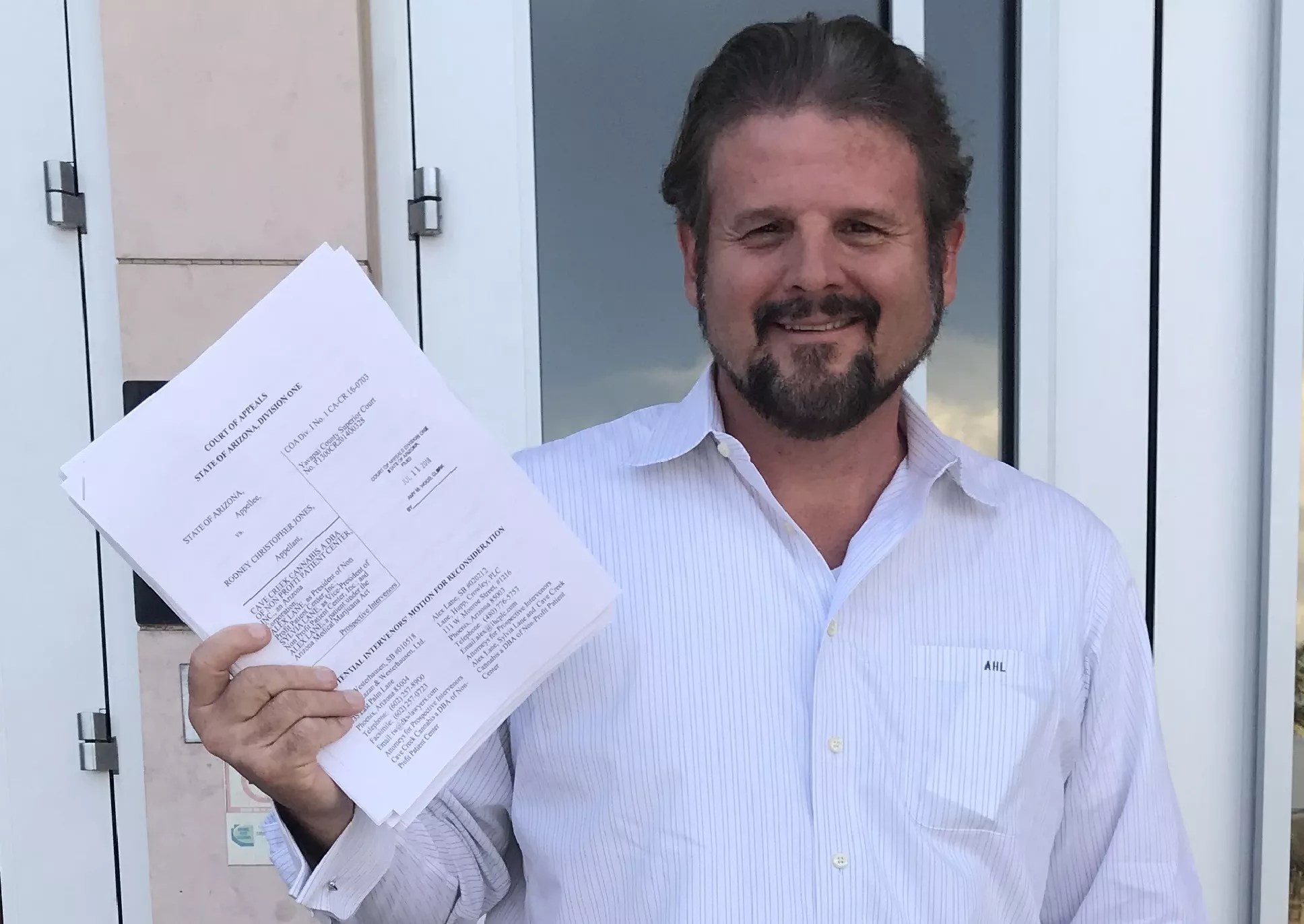
Courtesy of Alex Lane

Audio By Carbonatix
After the Arizona Court of Appeals ruled this summer that cannabis resin extracts, or concentrates, were not covered by the state’s medical-marijuana law, the industry rallied against the decision.
Several businesses, including Harvest of Arizona and K.I.N.D. Concentrates, released statements condemning the ruling and proclaiming they’d continue to sell concentrates, which the court claimed – in a backward interpretation of state law – were illegal “narcotics” despite the 2010 law’s protections.
Dispensary owner and criminal justice attorney Alex Lane wanted to take it one step further.
“Desperate times call for desperate measures,” he said.
Previously a prosecutor for Maricopa County, Lane has been a DUI and criminal defense lawyer since 2004. He joined the board of Cave Creek Cannabis Dispensary in 2015 and is currently its president.
Shortly after the appellate court’s June decision, Lane filed an unusual motion to intervene, confessing that he himself was a “narcotics” dealer.
“I have personally handed them across the table and received money from Arizona Medical Marijuana Act (AMMA) patients, so if you’re going to prosecute somebody, here I am,” he said.
His confession was turned away at the courtroom door. Some industry insiders weren’t sure it was such a good idea, but that wasn’t the end of Lane’s legal submissions.
Following the appeals court ruling, the Arizona Dispensaries Association – with Lane’s help – began the process of filing an amicus brief, and also started a patient defense fund should similar cases arise.
Rodney Jones, the medical-marijuana patient at the center of the appeal, was convicted in 2016 of possession of a small amount of hashish and sentenced to two years in prison. If the state Supreme Court upholds the appellate ruling, some of the most popular products in Arizona dispensaries likely would be removed from the shelves, and patients possessing them could face felony prosecution.
Lane, who has no direct connection to the case, sent a letter to Attorney General Mark Brnovich and Arizona’s 15 county attorneys detailing aspects of the 2010 Arizona Medical Marijuana Act that he claims should be mentioned to grand juries before bringing charges against patients in possession of concentrates.
It was another eyebrow-raising move for a lawyer who wasn’t representing a client. As Lane explained, prosecutors hoping to convict marijuana offenders must disclose potentially exculpatory information to a grand jury.
He wanted his letter to cause problems for prosecutors with judges.
“It definitely grabbed attention,” said Mike Colburn, founder of K.I.N.D. and Level Up Dispensaries.
The letter contained several points that diverge from the typical argument that marijuana and cannabis are synonymous.
“Everyone is focused on the definition of marijuana,” Lane said. “But that’s not where the answer is. The answer is in the word ‘medical.'”
Because Arizona legally considers cannabis medicine, he said, the statutes allow the industry to process the plant, including the extraction of its resin.
From another angle, Lane noted that the Arizona Supreme Court interpreted the AMMA broadly in seven cases it had previously considered regarding the law.
The Jones ruling, he said, is a “narrow” ruling, focused more on literal definitions.
Additionally, he went on, when it comes to voter-approved law, judges and lawyers conventionally apply broad interpretations with the understanding that citizens may not be as concerned about the language of a law as about its content.
The letter ended with a request for Brnovich to drop the case, which the AG eventually did, leaving Yavapai County Attorney Sheila Polk, who originally prosecuted Rodney Jones, to push the opposing view on concentrates.
Lane calls the Jones case a “hobby” of his. Though unorthodox, his efforts have earned him recognition from Arizona Attorneys for Criminal Justice, which cited Jones in awarding him its 2019 Presidential Accommodation.
AACJ President Craig Rosenstein commends Lane in his letter announcing the award for “the personal risks you took to protect the AMMA patients of Arizona as well as the outstanding legal arguments you offered.”
The Arizona Supreme Court decided to hear the Jones case on January 8, scheduling a hearing for March 21 at the Sandra Day O’Connor College of Law at Arizona State University.